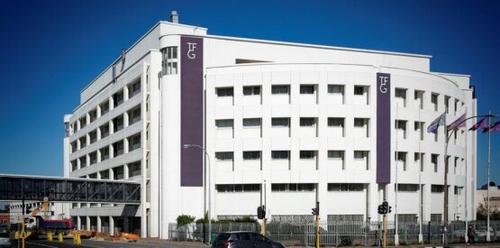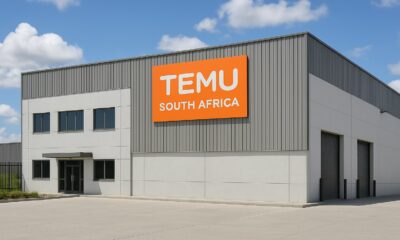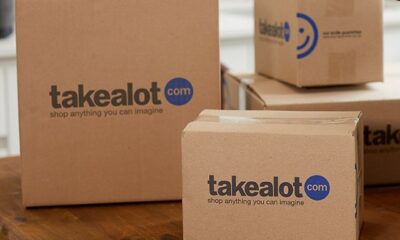Published
8 months agoon
By
zaghrah
Bash, the Foschini Group’s (TFG) flagship online platform, is no longer the underdog. In just over two years, it’s not only profitable it’s a direct challenger to e-commerce giants like Takealot, Temu, and Amazon in South Africa.
Launched in February 2023, Bash has quickly grown into one of the country’s fastest-rising digital retail platforms, bringing TFG’s 20+ household brands under one sleek, user-friendly app and web platform. From fashion to beauty and lifestyle products, Bash is designed to be a “one-stop shop” and it’s paying off.
In its latest annual results, TFG reported that online sales across Africa grew by 43.5%, with Bash contributing 5.8% to total TFG Africa sales, a jump from 4.2% the year before.
Even more impressively, Bash recorded R2.1 billion in sales revenue for the financial year ending 31 March 2025 — the equivalent of 195 physical stores, but without the overhead of rent, fixtures, or in-store stock risk.
“Bash achieved a standout performance in its second full year of operation,” said TFG, noting that each rand generated returned 25 cents in profit, a solid indicator in a sector known for thin margins and steep losses.
One of Bash’s boldest moves in 2024 was acquiring the Zando domain following the exit of Jumia Technologies from the South African market. That redirect now leads users straight to Bash — a strategic win to inherit a decade of brand trust and loyal online shoppers.
“For over a decade, you’ve trusted Zando… your shopping journey will continue,” reads a heartfelt message on the Zando redirect page. “We’re excited for you to shop brands and stores you know and trust on Bash.”
Bash was created within TFGLabs, the digital innovation hub of TFG. Its co-founders, Claude Hanan and Luke Jedeikin, are no strangers to the e-commerce space, the duo previously founded Superbalist, which was later acquired by Takealot, where they also served as senior executives.
With that pedigree, Bash wasn’t built to merely participate in the online retail space, it was designed to lead it. “You can’t outsource a core competency,” Hanan said. “Would a physical retailer ever outsource buying?”
This belief led to the development of a powerful in-house tech team of over 200 dedicated staff, ensuring tight control over app design, delivery logistics, and customer experience.
In an increasingly crowded space dominated by Temu’s aggressive pricing, Takealot’s logistics network, and Amazon’s global reach, Bash is carving a niche by:
Controlling its own supply chain from warehouse to doorstep.
Delivering premium user experience through an app prioritised in both design and performance.
Leveraging TFG’s massive retail footprint and inventory across South Africa.
Owning the last mile ensuring customer orders are delivered by a network they control, avoiding delays common with outsourced couriers.
The result? A fast, intuitive, and trustworthy platform that’s building strong customer retention — which grew 26% year-on-year.
South Africa’s e-commerce sector is rapidly evolving, but remains tough terrain. Between low internet access in rural areas, high delivery costs, and customer mistrust around online purchases, it’s no small feat to succeed — let alone turn a profit just two years post-launch.
TFG’s Bash has rewritten the script, proving that with the right mix of local insight, brand power, and digital infrastructure, homegrown platforms can thrive — and even outperform global competitors.
More than just a digital storefront, Bash is now central to TFG’s business strategy, driving innovation across customer service, supply chain, and cost efficiency.
With Amazon ramping up its South African operations, and Temu and Shein flooding the market with ultra-low-cost imports, the pressure on local platforms will only intensify.
But with Bash’s early wins and aggressive growth, the e-commerce war in South Africa just got a lot more interesting — and this time, it’s not the foreign giants with the upper hand.
As Bash co-founder Claude Hanan puts it: “We didn’t want to risk not modernising. And now, we’re not just modern we’re leading.”
{Source: My Broad Band}
Follow Joburg ETC on Facebook, Twitter , TikTok and Instagram
For more News in Johannesburg, visit joburgetc.com


The Digital Landscape of South Africa: A Story Told by Its Top Websites , Updated From December 2025


Temu’s “shipping confirmed” alerts leave South Africans feeling misled


Say Cheese, Then Shop: Amazon’s Picture Search Lands in South Africa


A Festive Season Letdown: Why Temu Orders Are Vanishing in South Africa


The Takealot Trolley Wins: Why SA Shoppers Are Sticking Local This Festive Season


Takealot’s ‘Get It Now’ brings instant delivery to Joburg and beyond















